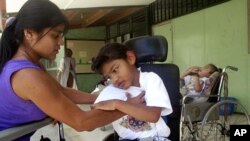“It’s thanks to your tireless efforts that we are able to raise awareness on the issues and daily challenges facing women and girls who live with disabilities,” U.S. Ambassador-at-Large for Global Women's Issues Melanne Verveer told the Women’s Institute on Leadership and Disability in Eugene, Oregon recently.
Mobility International USA’s Gender, Disability and Development Institute has successfully brought together women with disabilities from every continent, along with development professionals from many different sectors.
“I would like to acknowledge the hard work and dedication of women activists with disabilities and those who support them to improve the future for women and girls with disabilities around the world,” Ambassador Verveer said.
“Because of these efforts we know the great value of building networks, continuing dialogue, and supporting inclusive programs and efforts focused on economic empowerment, political participation, gender-based violence, and health, among so many other issues.”
Building the leadership capacity of women with disabilities worldwide is essential, and the Gender, Disability and Development Institute has played a vital role.
“All too often in my travels around the world I have witnessed the heartbreaking conditions in many places, the marginalization still faced by people with disabilities,” Ambassador Verveer said. “Our work is far from done.”
In July 2009, the United States joined 142 other countries in signing the United Nations Convention on the Rights of Persons with Disabilities. The Treaty, which advances many of the principles enshrined in the Americans with Disabilities Act and other critical U.S. legislation, also promotes, protects and ensures the full and equal enjoyment of human rights by all persons with disabilities.
It also underscores that women and girls with disabilities are subjected to multiple types of discrimination – both inside and outside the home, and are at greater risk of violence, neglect or exploitation, and have fewer opportunities to attend school and obtain employment.
“This is why we must continue to raise awareness and break down barriers to move people with disabilities from the margins of our societies to the mainstream so they, too, can fully participate in their societies at all levels,” Ambassador Verveer said in conclusion. “We will always continue to partner with you to raise the voices and improve the lives of all people with disabilities no matter where they live.”
Mobility International USA’s Gender, Disability and Development Institute has successfully brought together women with disabilities from every continent, along with development professionals from many different sectors.
“I would like to acknowledge the hard work and dedication of women activists with disabilities and those who support them to improve the future for women and girls with disabilities around the world,” Ambassador Verveer said.
“Because of these efforts we know the great value of building networks, continuing dialogue, and supporting inclusive programs and efforts focused on economic empowerment, political participation, gender-based violence, and health, among so many other issues.”
Building the leadership capacity of women with disabilities worldwide is essential, and the Gender, Disability and Development Institute has played a vital role.
“All too often in my travels around the world I have witnessed the heartbreaking conditions in many places, the marginalization still faced by people with disabilities,” Ambassador Verveer said. “Our work is far from done.”
In July 2009, the United States joined 142 other countries in signing the United Nations Convention on the Rights of Persons with Disabilities. The Treaty, which advances many of the principles enshrined in the Americans with Disabilities Act and other critical U.S. legislation, also promotes, protects and ensures the full and equal enjoyment of human rights by all persons with disabilities.
It also underscores that women and girls with disabilities are subjected to multiple types of discrimination – both inside and outside the home, and are at greater risk of violence, neglect or exploitation, and have fewer opportunities to attend school and obtain employment.
“This is why we must continue to raise awareness and break down barriers to move people with disabilities from the margins of our societies to the mainstream so they, too, can fully participate in their societies at all levels,” Ambassador Verveer said in conclusion. “We will always continue to partner with you to raise the voices and improve the lives of all people with disabilities no matter where they live.”




